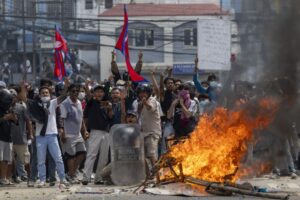By OLABODE OPESEITAN

The devastation witnessed during the recent Nepalese Gen-Z protests—marked by arson, killings, attacks on public institutions, and decades’ worth of irreplaceable loss—serves as a stark warning for Nigeria.
The right to protest is a core constitutional guarantee under Section 40, but applies only to peaceful, lawful assemblies. Once a protest descends into violence or is hijacked by actors with intent for arson, looting, or sabotage, it loses that shield and becomes a criminal act under Nigerian law.
Recent Nigerian history, notably the EndSARS protests, shows how quickly noble causes can be undermined: BRT buses, police stations across the country, and forensic/ICT labs in Lagos and Kano were burned, and businesses targeted and destroyed.
Legal authorities have responded with severity. Those charged with convening, promoting, or conspiring toward violent or government-destabilizing protest—as now widely discussed on social media—face accusations of treason, conspiracy, and incitement, crimes that attract the harshest penalties, including life imprisonment or even death.
Anyone tempted to use Nigeria’s current hardships as justification for Nepal-scale protest must remember: Nigerian law holds every citizen responsible for upholding peace.
Ignorance of these legal boundaries is not a defence. The law is unequivocal: calls for protests that explicitly urge Nepal-style upheaval, with the accompanying threat of arson or lethal violence, are interpreted as direct challenges to the state’s survival and public order.
Simply advocating for such actions is already a punishable offence, regardless of the original intention or the social media context in which such calls are made.
While the right to protest remains foundational for democracy and must be protected, it carries a duty to reject violence and respect the line between dissent and destruction. Those who mobilize, encourage, or celebrate protest movements must weigh the tragic precedent of Nepal and the bitter lessons of EndSARS: rhetoric matters—and so does legal accountability.
Anyone tempted to use Nigeria’s current hardships as justification for Nepal-scale protest must remember: Nigerian law holds every citizen responsible for upholding peace.
Appeals to ignorance will not suffice in court, and those found stoking the flames of chaos will bear the full consequences, no matter how well intentioned the original call.
READ ALSO: INTIMATE AFFAIRS: Are women stronger in bed?














